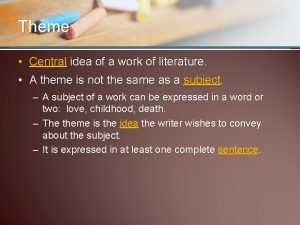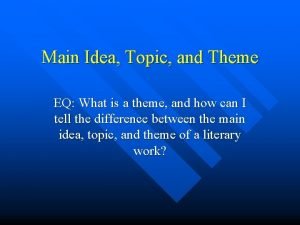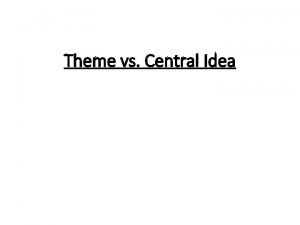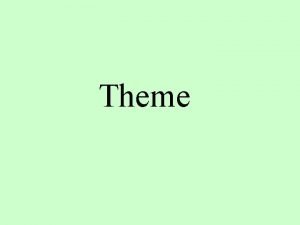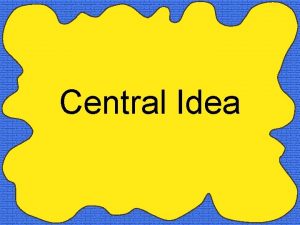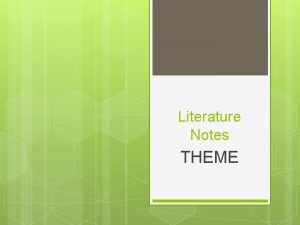Theme Central idea of a work of literature







- Slides: 7

Theme • Central idea of a work of literature. • A theme is not the same as a subject. – A subject of a work can be expressed in a word or two: love, childhood, death. – The theme is the idea the writer wishes to convey about the subject. – It is expressed in at least one complete sentence.

Theme (cont'd) • A theme is not the same as plot. – It is not just a statement about the characters in the story. Do not use character names in your theme statements. – It should describe human behavior in general, not events in the story. • A theme should be descriptive of the human condition and should not be a cliché.

More Theme • Sometimes authors state theme directly in a work of literature. • Most often, the reader has to think about all the elements of the work and use them to make an inference, or educated guess, about what theme is. – The theme must be the story’s main observation; it should not ignore major parts of the story.

Theme Formula • Sometimes in (general situation) a person may (general description of behavior/emotion) because (explain) Example (from “The Sniper”): Sometimes in war a person may have difficulty distinguishing the innocent from the guilty because the issues may be complex. Your Turn: Now write a theme for “Cask of Amontillado” or any other story you have read in the past using this formula and list what details in the story led you to this theme.

Verisimilitude • Verisimilitude—Where the events in a story seem like they could really happen or be true. • (Here’s a trick: Very Similar to Real Life!!!) • In storytelling, the audience contributes to the experience by their "willing suspension of disbelief". The more the story resembles reality - even in small details -- the easier it is for the audience to engage. Realism and plausibility are especially important ingredients.

Verisimilitude (continued) • Authors use many tricks to achieve verisimilitude, including: • References to popular culture • References to other works of art, music, or literature • Naturalistic dialogue (including dialect and slang) • Realistic events • Human weaknesses and flaws

Verisimilitude (continued) Your Turn: Which stories have we read this year that are great examples of verisimilitude? Why? Which are poor examples of verisimilitude? Why?
